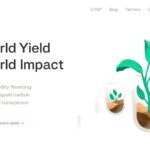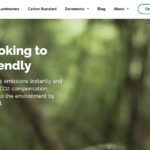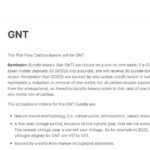Flowcarbon: A Brief Overview
Flowcarbon was founded in 2021 and recently raised $70 million in funding to develop it’s platform and to grow its team. 32 million was raised by a16z crypto, with participation from General Catalyst, Samsung Next, Invesco Private Capital, and others. Through the sale of a token – the Goddess Nature Token – the remaining sum was collected.
Flowcarbon works with two groups:
- Companies: Flowcarbon helps companies define and achieve their climate goals by analyzing their carbon footprint, building an offsetting strategy, providing access to inventory from carbon projects across the globe, and supporting marketing and communications efforts.
- Project developers: Flowcarbon helps project developers decide if a project is profitable and create a plan that fits their goals. Flowcarbon also uses different options to provide financing for new projects. Additionally, Flowcarbon explores different ways to sell developer’s carbon credits.
Let’s dive into Flowcarbon’s innovative way of financing climate projects through partnership with Centrifuge
financing through Centrifuge
Flowcarbon’s partnership with Centrifuge provides more affordable pre-issuance funding to climate project developers. This is made possible by creating a collection of forward contracts, specifically Emission Reduction/Removal Purchase Agreements (ERPAs) from emerging carbon projects, to be listed on Centrifuge’s Tinlake, an open DeFi protocol and marketplace for Real-World Assets (RWAs). The first pool Flowcarbon Nature Offsets Series 1 was launched using a specific algorithm:

Step 1: Initiation
On January 24, 2022, Flowcarbon entered into a Verified Emission Reduction Purchase Agreement (VERPA) with Quadriz Paraguay, SA. The deal involves the delivery of 85,000 carbon offsets (35,000 from 2020 and 50,000 from 2021) conforming to the VCS and CCB standards, amounting to $0.845 million. 60% of the amount was paid upon deal finalization, while the remaining 40% is to be paid upon the delivery of the carbon offsets to Flowcarbon’s account in the VERRA registry.
The offsets originate from the Corazón Verde Del Chaco Project (VCS 2611) located in the Gran Chaco forest, Paraguay, covering an area of 31,858 hectares.
Step 2: Financing
Flowcarbon established a subsidiary, Flowcarbon Nature Offset LLC (referred to as the Issuer), for selling tokens to investors.
On September 8, 2022, the Issuer launched the Flowcarbon Nature Offsets Series 1 pool. The aim was to raise 845,000 DAI by selling two variants of ERC-20 standard tokens to fund the VERPA between Flowcarbon and Quadriz Paraguay, SA:
- DROP tokens, capped at an annual interest rate of 15%, accrued from the successful completion of the funding round and ending upon the sale of carbon credits;
- TIN tokens, where holders receive a proportionate share of the profit from the sale of carbon credits after all dues to the DROP token holders are settled. Flowcarbon owns at least one-third of all TIN tokens.
The funding round was successful, and the Issuer directed 507,000 DAI to Flowcarbon for payments already made concerning the forward contract.
Step 3: Fulfilling the VERPA Commitments
Quadriz Paraguay, SA delivers the carbon offsets to Flowcarbon’s account in the VERRA registry and receive the remaining 330,000 DAI (40%).
Step 4: Monetization
Flowcarbon, either independently or through an intermediary, sells the acquired carbon credits.
Step 5: Token Buyback
The tokens are scheduled for redemption on June 30, 2023. The redemption order will depend on the sequence of applications via Tinlake, with DROP tokens being prioritized for redemption.
At the time of writing this post, the pool’s funds remain unutilized, and the token buyback is ongoing.
The effective annualized return of the pool’s DROP token over the last 30 days is 4.96%.
The effective annualized return of the pool’s TIN token over the last 90 days is -452.10%










